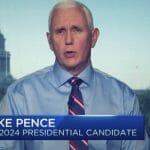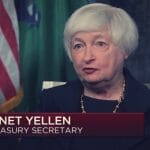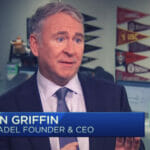First On CNBC: CNBC Transcript: Director for the White House Trade and Manufacturing Council Peter Kent Navarro Speaks with CNBC’s “Squawk on the Street” Today
WHEN: Today, Tuesday, July 2, 2019
WHERE: CNBC’s “Squawk on the Street”
The following is the unofficial transcript of a FIRST ON CNBC interview with assistant to the president and director for the White House Trade and Manufacturing Council Peter Kent Navarro on CNBC’s “Squawk on the Street” (M-F 9AM – 11AM) today, Tuesday, July 2nd. The following is a link to video of the interview on CNBC.com:
Q1 hedge fund letters, conference, scoops etc
White House's Peter Kent Navarro on new trade talks between the U.S. and China
SARA EISEN: We will start with trade, though. Stocks moving lower, just days after hitting pause in the trade war with China. This as the Trump administration ramps up pressure on the EU. Now proposing $4 billion in potential new tariffs over aircraft subsidies. Meantime, the President saying trade talks with China have already begun. And there are reports today, that during their meeting at G20 this weekend Chinese President Xi Jinping did ask President Trump to ease North Korean sanctions. Joining us now first here on CNBC, fresh from that G20 meeting and North Korea, Director of the White House Trade and Manufacturing Council, Peter Kent Navarro . Welcome back, Peter. Nice to have you.
PETER KENT NAVARRO : Great trip, and it’s good to be home.
SARA EISEN: Yeah. How would you characterize the progress that you made, specifically on those trade talks with Xi?
PETER KENT NAVARRO : Well, we’re reengaged. We’re talking on the phone already. There will probably be visits. It’s all good. I think it was a pause that was necessary at the time. But, this is very bullish for the markets, lower uncertainty in terms of the whole thing. We’re headed in a very good direction.
SARA EISEN: Except for we’ve been here before. We saw a trade truce after the last G20 meeting. That didn’t stick. Why should this time be different?
PETER KENT NAVARRO : So, this is a very complicated process. There’s seven different moving parts. We had a deal that was over 150 pages long with seven different chapters. That’s the basis now for moving further forward. It’s complicated. As the President said correctly, this will take time and we want to get it right. So, let’s get it right. In the meantime, in terms of the markets, I think it is very bullish for the markets. And the two things that really have to happen in the short run to get us Dow 30,000, and above are going to be passing the U.S., Mexico and Canada agreement, and having the Fed lower interest rates.
DAVID FABER: Mr. Navarro, there are those that say, ‘Well, we’ve got talks back on track but we actually gave some things up, namely, Huawei, for example, and got nothing in return for actually getting those talks back on track.’ What do you say to those critics who sort of wonder about that negotiating leverage that we potentially did not use?
PETER KENT NAVARRO : Well, there’s a couple of things there. I think what’s important about this negotiation is the close personal chemistry between President Xi and President Trump. President Xi requested some relief on Huawei. Here is the important thing: U.S. policy on Huawei with respect to 5G in this country has not changed. That will not happen with Huawei in this country. All we’ve done, basically, is to allow the sale of chips to Huawei. And these are lower tech items which do not impact national security whatsoever. Huawei remains on the entity list. But, more importantly, I think, China gave us some things, too. They promised immediate and significant agricultural purchases and we hope to see immediate, immediate progress on that. The important thing here is Huawei is small in the scheme of things. The important thing here is negotiations are back on track. Ambassador Lighthizer is actively engaged with President Trump guiding the whole process. And I think the markets should be very happy about that.
DAVID FABER: Yeah. Well, the market was happy yesterday, certainly. But you talk about Huawei being small in the scheme of things, which I guess I can understand. But, at the same time --
PETER KENT NAVARRO : No, no. Let me be clear here.
DAVID FABER: Well, you just said that. Yeah.
PETER KENT NAVARRO : Hang on.
DAVID FABER: Okay.
PETER KENT NAVARRO : Huawei—selling chips to Huawei—
DAVID FABER: Right.
PETER KENT NAVARRO : —a small amount of chips, less than a billion dollars’ worth of chips a year in the short run is small—
DAVID FABER: Okay.
PETER KENT NAVARRO : —in the scheme of things. 5G—the fight for 5G, President Trump is very committed to having the U.S. take the lead on 5G, building companies like Nokia and Ericsson up in Europe that will contribute to that process. So, 5G is huge.
DAVID FABER: Right.
PETER KENT NAVARRO : Selling a few chips to Huawei is not.
DAVID FABER: Okay, that’s – I mean, I guess people are still – and some of the companies, are still trying to understand exactly where we stand with that. Because, we have characterized them as a national security concern. I mean, you said, on our air:
PETER KENT NAVARRO : And they are. There’s no question.
DAVID FABER: ‘We have the bright light shown on Huawei, which is a very bad actor in the international arena.’ So that continues then. I should not take this as a—sort of a green light for Huawei in any real way, but just sort of a, what— an olive branch to some extent, to sort of help the Chinese at least think that we’re going to help keep them in business?
PETER KENT NAVARRO : Yeah, I think you probably said it better than I could. I think the thing here, I mean, if you think about Huawei, okay, there’s two things going on. One is Huawei is trying to dominate 5G using the usual Chinese playbook, which is to dump product below cost, steal the technology from their rivals and push everybody out. The problem, of course, David, is that you’ve got software issues. One patch and you can open somebody’s system to Huawei. You’ve got hardware problems, there can be trojans lurking. So, we have to be very clear about that. And we are going to work closely with our allies around the world and make sure Huawei 5G is not in those countries. But in the meantime, a small amount of low level chips are going to be sold to keep systems going, and that’s not a bad thing when it gets us back to the bargaining table with China and with China committing to immediate and significant purchases of agriculture goods. And let’s see if they deliver on that.
SARA EISEN: You know, the administration also decided to hold off on the additional tariffs, that threat that was hanging over of the $300 billion in imports. It all feels very un-Peter Kent Navarro like. Were you on board with how this went down?
PETER KENT NAVARRO : Totally on board. Look, we have 25% tariffs on $250 billion worth of Chinese products. That’s our insurance policy to keep these negotiations on track. It’s also our defense against Chinese predation. And we know what they do. They steal our intellectual property, they force the technology transfer, they dump products into their markets. These are the structural issues that we’re dealing with, not just for the United States of America but for the rest of the world. I mean, what we’re trying to get to is a place with China that it confirms to the rules of international trade as we know them, not as they know them. Because the rules this they follow are ones -- it’s more of a zero-sum game. We want to move beyond that. But, look, from an investors point of view, here is all you have to know: talks are back on track with the work that has been done to date. The 150-page plus document that serves as a way to move forward from there. There’s a lot of good work that has been done. You’ve got the best U.S. trade representative we’ve ever had in the U.S. in Bob Lighthizer and he’s working closely with President Trump who is actively engaged in all of this. And, so, we have a plan. I think people need to be patient. As the President said, he wants to get this right. These things take time. And this deal, by the way, is far more complex than anything we’ve ever negotiated, including the U.S.-Mexico-Canada agreement, which is the most sophisticated and smartest deal ever written. So, we’ve got a lot of good work to do but we’re doing it. And I think the markets should be happy about it, investors should be happy about it.
SARA EISEN: One thing that investors aren’t too happy with is that growth is slowing. And there’s some real evidence tariffs are having an impact, at least on the manufacturing. I mean, you have to admit that, Peter. We’ve seen a softness in the numbers and the new orders and the regional Fed manufacturing surveys. Is there some recognition within the White House that you need to speed up on the deal to prevent the economy from losing more steam?
PETER KENT NAVARRO : So, I don’t have to admit that at all. All I have to do is point to the Federal Reserve hiking interest rates unnecessarily too fast, too far, and engaging in massive quantitative tightening at a time when they should have been holding pat. And that -- what we’re feeling now is kind of the residual effect of that mistake that was done months ago. And the hope is that the Fed will do the right thing here and lower interest rates and get us back on track. The tariffs, in my judgment, are working beautifully. If you look at Q1 2019, we had a 3.1% GDP growth rate. And one point of that—for only one point of that was attributable to a reduction in the trade deficit, primarily with tariffs on China. And China is paying the tariffs. The Chinese producers pay the tariffs in the form of lower exports, lower prices and lower profits. The Chinese government pays the tariffs, in terms of a lower growth rate there and higher unemployment.
DAVID FABER: Peter, are we really going to have this argument again between the two of us about who pays? I mean, we’ve had a series of CEOs come on our air—
PETER KENT NAVARRO : Yeah. We are going to have this argument. See, look, David, David, David.
DAVID FABER: We have the CEOs that come on our air, Peter, all the time who say, ‘I don’t know how I’m going to pass it along. Certainly, if it went to 25. I don’t know. I’m going to swallow some of the margin.’
PETER KENT NAVARRO : So, David. David. If you’re a CEO-- hang on— if you’re a CEO.
DAVID FABER: Yeah, I’ll listen.
PETER KENT NAVARRO : You’re going to come on and you’re going to say whatever it is that’s going to advance your multinational model to offshore products to China. That’s what you do. And the day you start believing what Chief Executive Officers say is the day that you’ve fallen into the deep swamp, buddy, and I’ll send you a snorkel.
DAVID FABER: I’ve been doing this a long time.
PETER KENT NAVARRO : So, have I.
DAVID FABER: And sometimes I believe them and sometimes I don’t.
PETER KENT NAVARRO : Well, don’t believe them on this point, because the problem is: look, here is the difference. This is not a tariff on the rest of the world. It is a tariff on China. What we’re seeing is all this production move either here or Vietnam, Malaysia, Thailand. China did, by the way, devalue its currency by 10% to offset the 10% tariffs on that $200 billion. So—and we’re seeing zero inflation. I mean, point me to this inflation, David, that’s supposed to exist from the tariffs. You cannot find it.
DAVID FABER: No, but—
SARA EISEN: Because you guys haven’t – you’ve spared lot of the consumer companies so far. I mean, go through with that next $300 billion and you should see it, right, Peter?
PETER KENT NAVARRO : Well, that’s another discussion in another segment. But for now, thank you for admitting that the first $250 billion have had zero effect on inflation and China is paying the tariffs. You made my argument. Q.E.D. Beautiful.
DAVID FABER: China is not paying the taxes –
PETER KENT NAVARRO : She just said it.
SARA EISEN: No, no, no. What I said was that –
PETER KENT NAVARRO : She said there was zero inflation. Somebody has got to be paying for it. It’s not us. It’s not American consumers.
SARA EISEN: Well, inflation has been soft, but that’s because you guys have spared apparel and footwear and some of the equipment that consumers do pay for.
DAVID FABER: iPhones.
PETER KENT NAVARRO : Alright, like I said, let’s have that conversation if and when the President decides to raise the tariffs on the last -- what we call the fourth tranche of Chinese products.
DAVID FABER: Right.
PETER KENT NAVARRO : But remember, what we’re fighting for. I mean, look: you and I, we agree—
DAVID FABER: We do. We know.
PETER KENT NAVARRO : —we agree, right? We agree that China needs to basically clean up its act big time, and that they have had 15 years over the course of Obama and Clinton.
DAVID FABER: There is little doubt, and there’s –
PETER KENT NAVARRO : My guy is the guy who is standing up for the American people. So, we all agree on that.
DAVID FABER: Peter, I certainly hear it from a lot of business leaders supportive of the efforts you’re making here. I guess I’d like to get to that, back to sort of the issue at hand.
PETER KENT NAVARRO : Sure.
DAVID FABER: I mean, Secretary Mnuchin has talked about, well, we’re 90% of the way there. But, that 10%, do we still want the Chinese to commit to legislation that enshrines some of these things we want them to do on intellectual property, on any number of—on technology transfers? Because they seem to be pretty dead set against doing that.
PETER KENT NAVARRO : So I’m not going to infringe upon Robert Lighthizer’s territory as the trade rep. I’m going to let him do the negotiations behind closed doors. And when the time comes, the big reveal will happen, and I’ll be here to talk about what exactly happened. But before then, let’s let the negotiations go. I think that’s what the important thing is. Let’s have the negotiations done soberly, quietly, behind closed doors and then all will be transparent when the time comes. We need to get to a deal. And it will either be a great deal or it won’t. That’s President Trump’s words and he’s our leader on this. And look, I mean, the other thing we should agree on, before President Trump took office, we spent over a decade where nobody even bothered to challenge the Chinese on their trade practices and now we have them at the table, at the table. That’s good. That’s good.
DAVID FABER: No, we do. But I guess the concern among some is that to the extent that we’ve got them there that we really can follow through and actually get the meaningful changes, the systemic changes that people want.
PETER KENT NAVARRO : Well, we’re working towards it. You guys always want more. That’s the problem, David.
DAVID FABER: Well, you know, that’s what life is about. Come on.
PETER KENT NAVARRO : We’re working on it. Indeed, yes.
DAVID FABER: We only get one shot at it, Peter. You’ve got to have more.
PETER KENT NAVARRO : Well, we’re working on it. And nobody -- look, coming back from the G20 and DMZ, who could have imagined the kind of progress that was made? I mean, look, I was in a lot of those bilateral meetings at the G20 and in every single one I saw the President with his unique brand of personal warm diplomacy, having good relations with leaders across the political spectrum, advancing American economic and national security interests. I mean, to be able to call Saudi Arabia any time the price of oil spikes and say, ‘Hey, help us out, pump some more oil,’ that’s a good thing. Those are the kinds of things. To be able to call the Turkish president and prevent him from killing tens of thousands of Kurds in Syria, that’s a good thing. This is what this President does. I would say, in my judgment, this is the best foreign policy president since Reagan, by a long shot. I mean, particularly the walk seen around the world, the handshake seen around the world across the DMZ. I mean, that man was bold. I mean, he walked over there without an entourage of security guards right into North Korea. Who would have the chutzpah to do that, David?
DAVID FABER: Well, we can discuss that part of it but really, I what I like talking to you about is more focus of your efforts –
PETER KENT NAVARRO : Indeed.
DAVID FABER: –and certainly what you’ve written a lot of books about, Peter.
PETER KENT NAVARRO : I’d like to talk about what you’ve written backs about, David.
SARA EISEN: Well, was that part of it? Was the North Korea meeting part of the trade talks at all part between the U.S. and China?
PETER KENT NAVARRO : No. I think what’s important about the North Korea issue is that if President Trump weren’t in office, we’d likely to see the soil of North Korea rocking with nuclear tests. We’d likely see missiles going over Japan and Korea, getting ever closer to the United States of America. And instead we have an era of calm on the Korean peninsula, which again from an investor’s point of view, world markets point of view, that’s very bullish. So, kudos to the President for pulling off foreign policy like that. One of the things I do at the White House --
DAVID FABER: Well, it’s not a done deal.
PETER KENT NAVARRO : Of course not. Of course not.
DAVID FABER: It’s not a done deal, Peter, in any way, shape, or form.
PETER KENT NAVARRO : But, let me say this. I mean, one of the things I do at the White House is weave together this whole idea that economic security is national security, so that when we sell a THAAD system to the Saudis, that helps stabilize the Middle East but it also creates tens of thousands of jobs across over 40 states in the United States. And so, this whole negotiation with North Korea is, again, stabilizing and it allows the world economy to grow—
DAVID FABER: I get it. I get it.
PETER KENT NAVARRO : --not under the cloud of nuclear holocaust.
DAVID FABER: You know, I can’t help but think back to Huawei, though, when you talk national security and trade and economic—
PETER KENT NAVARRO : Small amount of chips, David. Small amount of chips.
DAVID FABER: Understood. But 5G, which you raised earlier. I mean, you can say all you want about it but many people think we’re not in the league. That regardless the Chinese are – they’re investing a great deal more, that Huawei is the leader there and conceivably around the world will be and that we’re behind. I mean, you even mentioned Ericsson and Nokia. They’re not U.S. companies, Peter.
PETER KENT NAVARRO : Well, this is funny that you say that because we’re always being criticized for not engaging in alliances around the world. And, with 5G, I think that’s going to be the poster child for working with Europe, with working with Asia, Japan, South Korea in getting to be first in 5G as a world with Europe and our allies in Asia. So, Nokia and Ericsson are part of that. And we have a lot of American companies that will be part of that. The important thing is to dominate that space and we’re working on it. And, remember—
DAVID FABER: Yes.
PETER KENT NAVARRO : -- you know, the whole China game plan, the China 2025 is to dominate not just 5G but artificial intelligence, blockchain technology, and we can’t let that happen. President Trump is a visionary on this, and he’s put his foot down, and we’re going to make sure that the U.S. is the innovation leader. And, more importantly, after we innovate, we keep our technology and our IP.
SARA EISEN: How badly do you need to make this deal before the election?
PETER KENT NAVARRO : Look, the President doesn’t do things with the idea towards the election. That’s one of the things I admire about him. He does the right thing for the American people. So, we’re going to get a deal. That’s a great deal for America. We’re not going to sacrifice anything in order to get a cheap political trick. And I love this guy for that. I see this every day, when— if I’m with him. It’s just a great thing. He truly cares about the American people, the men and women, particularly those who work with their hands in our factories and on our farms and he’s going to do the right thing here.
SARA EISEN: What about the new tariffs you guys are putting out there threatening for Europe on the Boeing aircraft WTO decision? Can europe expect a harder line? Should Europe expect a harder line from the U.S. now, as it relates to tariffs, possibly the auto import tariffs and other sort of more aggressive measures.
PETER KENT NAVARRO : So, just for your viewers, this is a hard shift, okay. We’re going over to a completely different topic. So, just as a little bit of background, there was a case at the WTO against Europe for heavily subsidizing Airbus. And working within the WTO, we were able to get a favorable judgment on that. And, as we speak, the United States Trade Representatives’ office is working on what our relief might be, which would be in the form of tariffs. So again, let’s let that play out. I think Ambassador Lighthizer will have some announcement on that in the coming weeks. But you know, look, Boeing is a very important part of the Dow, by the way. It’s being harmed materially by heavy subsidies to Airbus. And we stood up for Boeing on that and we’ll see what happens. The idea -- what we’re seeking is to get fair and reciprocal trade without heavy subsidies from foreign governments to take our jobs, and that’s the mission here as well. Can’t disagree with that. I mean, that’s—we need to--
DAVID FABER: No.
PETER KENT NAVARRO : We need to do that.
SARA EISEN: It strikes me that you said that the market could get – the Dow could get to 30,000 if the Fed lowers interest rates and the U.S. can pass the USMCA. So, you don’t think the market is hanging on this China trade deal?
PETER KENT NAVARRO : I think the market should be taking comfort now from the fact that we’re moving from the China trade deal. But in the short run, the best thing to do to get the market up is to cut interest rates and pass the USMCA, which should be passed this summer. I have a little bit of credibility, the day after the election, I don’t know if you remember this, but I was on CNBC on "Squawk" and the futures were like dead, futures were dead down, red, and I described how we would get to Dow 25,000 on the basis of tax cuts, deregulation, cheaper energy, and a level playing field on trade. And, besides the President, I think I was the only one in the world who predicted that. And I just got lucky on that, I guess, or President Trump is a great president on the economy. You take your choice there.
DAVID FABER: Yeah, well I know how you feel about it. For sure.
SARA EISEN: Even with the Fed tightening. You got there even with the Fed tightening. Which is why you think --
PETER KENT NAVARRO : Yeah, he threw us. Jay Powell threw us—I don’t know if it’s a curveball or a fastball at the head. But that cost us a half to one full point of growth, but we can get that back if the Fed does the right thing. Look, the U.S.-Mexico-Canada agreement is ready to go. We just need to get a final negotiation with the Democrats on Capitol Hill on enforcement issues. And let’s get that passed. If it gets to the floor, it will pass overwhelmingly with bipartisan vote. It will get us initial – more than a GDP growth point, half a million jobs, 75,000 jobs in the auto sector. I mean, it is a beautiful thing when it comes to economic stimulus and bringing jobs home with things like rules of origin in it. So, let’s get that done. I mean, there’s no reason why we shouldn’t get that done other than petty politics. And I don’t think -- I think Capitol Hill is going to do the right thing on this. I don’t say that very often. But, I think on this one, because of the stakes involved, across every single state in the union, I think they are going to do the right thing and they will do it this summer. And we’ll get the Dow at 30,000. And I’ll sit in this chair when that happens and we’ll party like it’s 2020.
DAVID FABER: There you go.
SARA EISEN: Keep us posted on the progress, Peter. Thank you for joining us.
PETER KENT NAVARRO : My pleasure.
SARA EISEN: Peter Kent Navarro of the White House.













